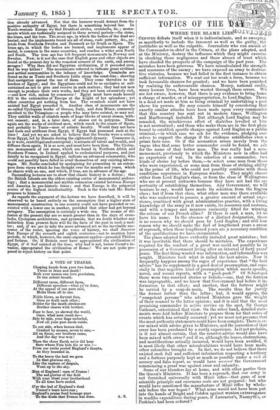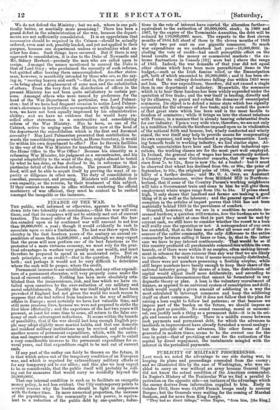• 7 Lt alierff L ..? It - Aiiivr
TOPICS OF THE
WHERE THE BLAME LIESY10137kLaadS CErrsurz defeats itself when it is indiscriminate, and so sweeping as manifestly to include the innocent as well as the guilty, the justifiable as well as the culpable. Journalists who run amuck at the Commander-in-chief in the Crimea, at the plans adopted, and at the Ministry, destroy the influence which they might exercise in checking those negligences and those abuses of trust which have clouded the prospects of the campaign of the past year. The mistakes have been grievous. We have miscalculated the strength and resources of the enemy ; we have exposed an army to destruc- tive victories, because we had failed in the first instance to obtain sufficient information. We sent out too weak a force, because we took favourable chances for granted; and we have been punished by realizing the unfavourable chances. Money, national credit, many human lives, have been wasted through these errors. We are not aware, however, that there is any evidence to bring home a charge of murder, or of misappropriation, to Lord Raglan. There is a dead set made at him as being criminal by undertaking a post above his powers. He may console himself by considering that exactly similar attacks have been made upon every commander that this country has sent out in modern times, Wellington• and Marlborough included. But although Lord Raglan may be consoled, the mischievous effect of diatribes levelled at him is not neutralized ; and those who make them are in the first place bound to establish specific charges against Lord Raglan as a public criminal,—in which case we ask for the evidence, pledging our- selves to support the charge if the evidence establishes even a prima facie case. Or if the accusation arises merely from the vague idea that some better commander could be found, we ask for the name of that better man. The war really had a com- mencement, previously to which the Ministers now in office had no experience of war. In the selection of a commander, two kinds of choice lay before them,—to select some man from those who were experienced, or some man from those of striking ability in the prime of life, who could not possibly combine with those conditions experience in European warfare. They might choose either from Lord Raglan's class, or from the class of Wellingtons who are at present unknown because they have not had the op- portunity of establishing themselves. Any Government, we will venture to say, would have made its selection from the Raglan class ; but if from that class, what other man was there available who was understood to possess a greater amount of actual expe- rience, combined with ,great administrative practice, with a living knowledge of the army as it now exists, its resources and customs, and with a temper and manners eminently fitted for winning the esteem of our French allies ? If there is such a man, let us have his name. In the absence of a distinct designation, there is no reason why we should pass by Lord Raglan ; and still less reason why we should make the fact of lengthened years a cause of reproach, when those lengthened years are _a necessary condition of the qualifications we have enumerated.
The plans adopted have evidently included great mistakes ; but it was inevitable that there should be mistakes. The experience required for the conduct of a great war could not possibly be in possession of a Government living after an interval of forty years' peace. The first thing wanted was information, and information was sought. Ministers took what is called the best advice. Now it frequently happens among the sages of experience that "the best advice" has its supplement in a good deal of presumption, and espe- cially in that negative kind of presumption which meets specific, novel, and recent reports, with a " pooh-pooh !" Of Sebastopol there were two received stories or beliefs,—one, that the fortress was impregnable, and we know that Government had before it in- formation to that effect; and another, that the fortress might be carried by a coup-de-main. The results thus far justify the former rather than the latter ; but, it would appear, the "competent persons" who advised Ministers gave the weight of their counsel to the latter opinion ; and it is said that the most promising commander in active service on the spot, Sir George Cathcart, entertained that view. On the other hand, detailed state- ments were laid before Ministers to prepare them for that series of events which has actually occurred : yet we must not presume that the most authentic statements could have been complete. There is er- ror mixed with advice given to Ministers, and the correction of that error has been purchased by a costly experience. Is it not probable, is it not almost certain, that the counter-advice would also have been- mixed with error ? and if so, although the losses, obstructions, and modifications actually incurred, would have been avoided, it is moat likely that other miscalculations would have been made, other calamities brought on. In fact, we do not believe that there existed such full and sufficient information respecting a territory and a fortress purposely kept as much as possible under a veil of secrecy and false report, as would have secured the Government commencing a great war against error and calamity. Some of our blunders lay at home, and with other parties than the Queen's Ministers. It has been a reproach, that our army is not furnished universally with Mille rifies—that gnus of new scientific principle and enormous scale are not prepared : but who would have sanctioned the manufacture of Mime rifles by 'Whole- sale before the war began ? What arms would not have been put into the hands of Bright and Cobden against wanton extravagance in warlike expenditure during peace, if Lancaster's, Nasmyth's, or Perkins's had been ordered ? We do not defend the Ministry; but we ask, where is one poli- tically better, or martially more promising? There has been a grand defect in the administration of the war, because the depart- ments are not sufficiently consolidated. It is an opprobrium that necessaries should be required in the Crimea—should be actually ordered, even sent out, possibly landed, and yet not applied to their purpose, because one department undoes or neutralizes what an- other has done. Such things have occurred. But if there is any approach to consolidation, it is due to the Duke of Newcastle and Mr. Sidney Herbert—precisely the men who are called upon to resign. Amongst the names mentioned to succeed the Duke is that of Lord trey; who proclaimed the necessity of such reforms, but quitted office leaving them ustacoomplished. Another states- man, however, is manifestly intended by those who are, as the say- ing is, "moving heaven and earth "—that is, the press and society —to bring about a displacement of some men and the substitntion of others. From the very first the distribution of offices in the present Ministry has not been quite satisfactory to certain per- sons. Amongst others who were named by preference ,for the head of the War Department in particular, was Lend Palmer-, ston : but if we have had frequent occasion to notice Lord Palnier- ston's cleverness in lawyer-like correspondence with foreign minis- ters, we have not been equally impressed by his adtainistrative ability; and we have no evidence that he would have ex- celled other statesmen in a constructive and consoliflating reform of the War Ministry. Has he been, as one of the Cabinet., active in urging upon the Minister now at the head of the department the consolidation which is the first and foremost necessity -P Has Lord Palmerston presented that contribution to- wards the consolidating process which, as Home Secretary, it would lie within his own department to offer? Has he thrown facilities in the way of the War Minister for transferring the Militia from the Home Office to the War Office? Because his sincerity as a reforming War Minister, his judgment as a reconstructer, and his special adaptability to the want of the day, might almost be tested by what he has done, or has declined to do, in reference to that particular detail of the desired reform. The present Ministry, in- deed, will not be able to acquit itself by proving the want of ca- pacity or diligence in other men. The duty of consolidation is essential, paramount, and pressing. Ministers will establish their own .capacity, or the reverse, by their treatment of this subject. If they consent to remain in office without rendering the official machinery of war efficient, they must be content to be ranked • amongst the incapable or the insincere.







































 Previous page
Previous page